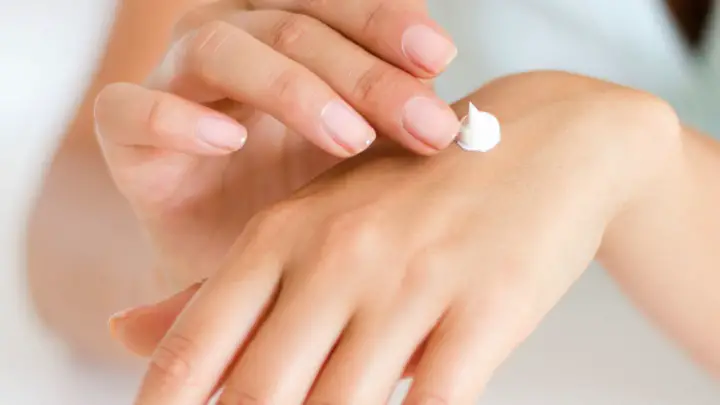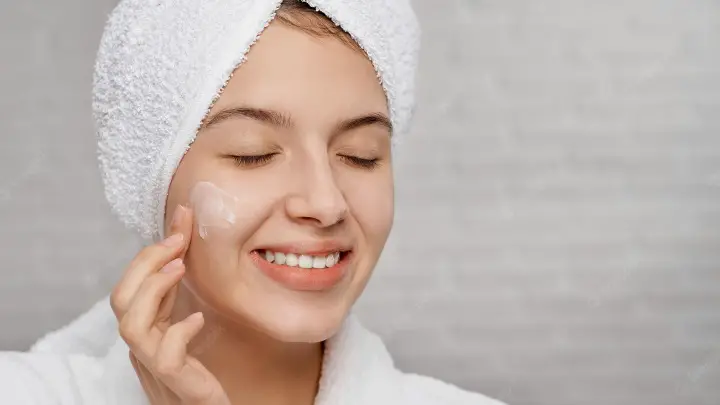Many things can cause acne, but is lotion one of them?
The answer is yes and no. It all depends on the ingredients in the lotion and the way you apply it to your skin.
The article will cover whether lotion can cause acne, how much lotion to use, and how to choose a lotion for acne-prone skin. I’ll also give you some tips on how to take care of acne-prone skin, so keep reading.
Can lotion cause acne?
Most lotions cannot cause acne.
However, some lotions contain pore-clogging ingredients like beeswax and mineral oil, which can aggravate existing acne or cause new breakouts. If you’re concerned about a particular ingredient in a lotion, it’s best to consult your doctor before using it.
It’s also important to know that applying too much lotion (aka over-moisturizing) can cause acne. If you’re using a non-comedogenic lotion and are still having acne, applying too much lotion might be the cause.
That said, lotions in general, are safe to use on all skin types, including acne-prone skin. If you find that your lotion is causing breakouts, you may want to reduce the amount of lotion you use or switch to a different lotion.
How much lotion should you use if you have acne?
Generally speaking, a nickel-sized amount should be enough for your entire face if you have acne.
So it’s best to start with this amount and gradually increase it if you need to. Additionally, make sure you’re gentle when applying lotion to your skin.
Use your fingertips and pat the product on your skin instead of rubbing it in. With a bit of trial and error, you should be able to find the right way to apply lotion to your skin.
Can lotion help treat acne?
The answer is yes.
While lotion alone may not be enough to treat acne, it can be a helpful part of a comprehensive skincare regimen. Lotions that contain ingredients like salicylic acid and tea tree oil can help reduce inflammation and kill acne-causing bacteria.
Additionally, lotions that contain antioxidants, like vitamin C, can help reduce the appearance of acne scars and dark spots. Finally, lotions contain moisturizing ingredients like hyaluronic acid that help reduce the risk of further breakouts.
Nevertheless, it’s important to remember that lotion alone is unlikely to clear up acne. You may need to use other treatments or medications to achieve the best results.
How to choose a lotion for acne-prone skin
Look for water-based
It’s important to choose a water-based lotion that doesn’t contain any oils. You can find these kinds of lotions in the skin care aisle of most supermarkets and drugstores.
Check for non-comedogenic
If you have acne, check for lotions that have a non-comedogenic or non-acnegenic label. These products do not contain pore-clogging ingredients like petroleum jelly, mineral oil, lanolin, or beeswax.
Look for hyaluronic acid
Hyaluronic acid is a substance that occurs naturally in the skin and helps to hydrate the skin. It also has anti-inflammatory and soothing effects that help to reduce the pain and redness associated with acne.
Some products may contain more hyaluronic acid than others, so choose one with a high concentration of this ingredient.
Check for natural ingredients
Natural ingredients like aloe vera and tea tree oil have anti-inflammatory and antibacterial properties, which help to soothe the skin. They also help promote healing while keeping the skin hydrated, so make sure the product you’re choosing has them.
NOTE:
If you’re not sure whether a particular lotion will cause acne, it’s best to test it out on a small area of skin before applying it to your entire face. Pay attention to how your skin reacts after using the lotion, and discontinue use if you notice any irritation or new blemishes.
Do and don’ts for acne
Acne is a common skin condition that can be frustrating to deal with. Fortunately, there are a few simple dos and don’ts that can help you manage it.
Dos:
- Wash your face twice a day with a mild cleanser that contains salicylic acid.
- Wear sunscreen with an SPF of at least 30 when you go out in the sun.
- Eat a balanced diet that includes plenty of fruits, vegetables, nuts, and healthy carbs.
- Use non-comedogenic makeup and skin care products.
Don’ts:
- Don’t touch or pick at your acne. Your hands can transfer bacteria from other parts of your body to your face, which can cause breakouts.
- Don’t use harsh soaps or abrasive scrubs on your face. These can be too harsh for sensitive skin and cause irritation and breakouts.
- Don’t over-scrub your face when washing it. This can lead to irritation and even cause bleeding if you have sensitive skin.
- Don’t lay in the sun without protection. This can lead to an increase in oil production, which can trigger another round of breakouts.
By following these simple dos and don’ts, you can help keep your acne under control and enjoy clearer skin.
Frequently Asked Questions

Does lotion help with dark spots?
Yes, it does.
Most lotions contain ingredients like vitamin C and niacinamide, which help fade dark spots as well as other blemishes. So if you have dark spots on your skin, lotions can be a great solution for them.
What skincare product causes acne?
Face oils.
When face oils mix with your skin’s natural oils, they can clog your pores and trap bacteria inside. The bacteria then multiply and cause inflammation, leading to red, swollen pimples.
Does hydrating your skin help acne?
Yes, it does.
Hydrating your skin helps to prevent dryness and irritation, both of which can contribute to acne. It also helps flush out toxins and impurities that can clog pores and lead to breakouts. So, if you’re struggling with acne, be sure to hydrate your skin.
What causes excess oil?
The most common causes of excess oil production are hormones, diet, and genetics. Another common factor that can lead to excess oil production is the use of certain medications.
Should you apply serum if you have acne?
Yes, you should.
Serums contain ingredients like salicylic acid and glycolic acid, which help reduce oiliness and reduces redness. So, if you have acne, choose a serum with these ingredients and include it in your skincare routine.
Conclusion
While there’s no definitive answer to whether lotion can cause acne, it’s important to avoid lotions that contain pore-clogging ingredients altogether.
It’s also important to use a nickel-sized amount of moisturizer and avoid over-moisturizing your skin to prevent acne.
That being said, be sure to choose a lotion that’s water-based and non-comedogenic when shopping for acne-prone skin. It would also help if you choose a lotion with hyaluronic acid and natural ingredients like aloe vera.
Thanks for reading.
Want to know more about lotions and acne? Visit Serum101 today.







